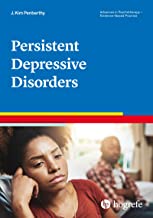Persistent Depressive Disorder
A mild but long-term form of depression.
Dysthymia is defined as a low mood occurring for at least two years, along with at least two other symptoms of depression.
Examples of symptoms include lost interest in normal activities, hopelessness, low self-esteem, low appetite, low energy, sleep changes, and poor concentration.
Treatments include medications and talk therapy.
Cluster Number:
Wiki Number: PW161
Diagnosis: Persistent Depressive Disorder-Dysthymia
US Patients: 3-6% during lifetime
World Patients: 105 Mil per year (1.5% of the population)
Sex Ratio:
Age Onset: 21, before 21 called “early onset”
Brain Area: In women, the corpus callosum and frontal lobes differ from normal; the amygdala, insula (sadness) and cingulate gyrus(emotions)
Symptoms: 2-years for adults; 1-year for children, deep depression with longer-lasting insomnia or hypersomnia and low self-esteem
Progression: little enjoyment in anything, suicidal behaviors, other disorders or addictions; hopelessness about life
Causes: genetic for 50% of cases; 75% have other physical illnesses, disorders or addictions; 95% have episodes of major depression.
Medications: antidepressants, but 6-8 weeks before progress; SSRIs, lithium
Therapies: cognitive therapy, better sleep, exercise
Youtube Video:
Life with Persistent Depressive Disorder (also known as Dysthymia)
Amazon or Library Book: Persistent Depressive Disorders
Click the book to link or order from Amazon.

